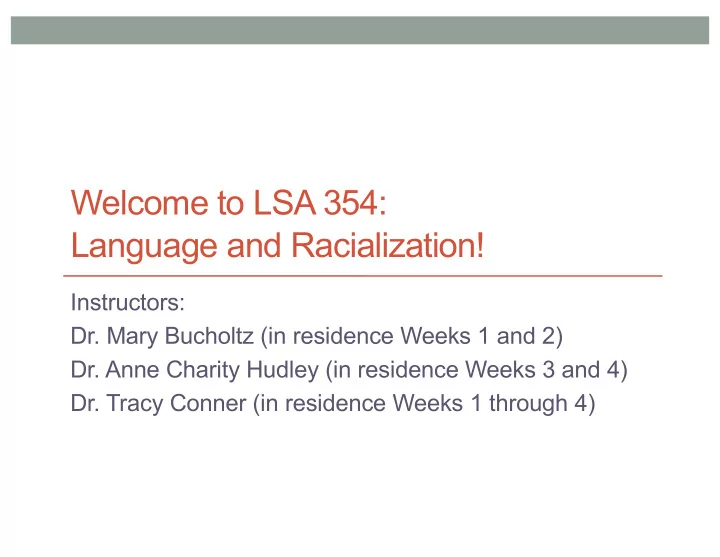

Welcome to LSA 354: Language and Racialization! Instructors: Dr. Mary Bucholtz (in residence Weeks 1 and 2) Dr. Anne Charity Hudley (in residence Weeks 3 and 4) Dr. Tracy Conner (in residence Weeks 1 through 4) 1
2 Acknowledgment of the stewards of this land • For thousands of years, this land has been the home of Patwin people, including the Yocha Dehe Wintun Nation today. The Patwin people have remained committed to the stewardship of this land over many centuries. It has been cherished and protected, as elders have instructed the young through generations. We are honored and grateful to be gathered here today on their traditional lands. • Who are the stewards of the land at your home institution? How, if at all, does the institution try to repay the debt it owes to the Indigenous people of your area? • This is an issue of language and race—and of tribal sovereignty and violent dispossession
3 Course information • All materials for the course will be available on Orbund • Currently available • Syllabus • Schedule for Week 1 • Assignment 1 • Sample of Assignment 1 • Readings for Week 1 • Slides will be posted after each class • So you don’t have to frantically take notes; instead focus on listening, thinking, and talking • Week 2 schedule and readings will be available by the end of the week
4 Introductions • Your name and pronouns • Undergrad/grad/faculty, home institution, field(s) and subfield(s) of interest • What is your racial and/or ethnic identity? (however you interpret these terms) • What do you hope to get from this class?
5 Discussion • Turn to someone near you, introduce yourselves, and discuss the following: • What are some of the ways that people define or understand ”race”? What are some of the ways that they define or understand “ethnicity”? • What racial categories have you encountered in the U.S. context? What ethnic categories have you encountered? • These definitions/understandings/categories may or may not be ones that you use or agree with—just focus on whatever ideas of race and ethnicity you’ve encountered
6 What is race? • Myth • Race is a set of inherent biological differences between human groups • Reality • There is no biological way to exhaustively and uniquely classify humans into groups • Biological claims about race are pseudoscience, not science • 85 to 95% of genetic variation is within “races,” not between them • It is impossible to group people into distinct “races” based on bundles of genetic traits
7 What is ethnicity? • Myth • Ethnicity is a set of deep-rooted cultural differences between human groups • Based on national origin, language, and cultural practices (e.g., food, clothing, music) • Reality • Ethnicity is a flexible category of affiliation on the basis of heritage • Heritage may be understood as cultural, national, linguistic, and/or racial
8 The ideology of race and ethnicity • Both race and ethnicity are ideological, not “real” • ideology : a set of cultural beliefs treated as common sense • Confer advantages on some social groups over others • Both race and ethnicity are based on essentialism • ideology of inherent differences between groups and inherent similarity within groups
9 The social reality of race and ethnicity • Race and ethnicity are not scientifically real • But they have real-world social effects for power and exclusion • Race and ethnicity are social constructs • Created by people • Change over time and across spaces • Can therefore be changed and challenged • Race and ethnicity are therefore better understood as racialization and ethnicization (more on this next time) • In the U.S. context, race and ethnicity are often not sharply separated • ethnoracial : a cover term for race and/or ethnicity
10 Panethnicity • An overarching ethnoracial category that includes specific ethnic categories • Asian American/Pacific Islander • Chinese American, Pakistani American, Fijian American ... • European American • German American, Armenian American, Latvian American ... • Native American • Navajo, Patwin, Alutiiq... • Latinx • Salvadoran American, Chilean American, Puerto Rican, ... • ?? Spanish American, Brazilian American • African American • Sudanese American, Ghanaian American, Jamaican American, ... • Relies on an ideology that nationality maps onto ethnicity
11 The current dominant U.S. ethnoracial taxonomy Panethnic term Racial term Older or dispreferred terms African American black, Black Negro, colored, Afro-American Asian American/ Asian Oriental Pacific Islander European American white Caucasian, Euro- American Latinx (none, but often Hispanic, Latin viewed as racial) (depending on region) Native American (none, but often American Indian viewed as racial) (often OK to use)
12 The role of language in race and ethnicity • All social construction, including the construction of race, takes place largely through language • Language is used for: • Categorization : To label social groups by race and ethnicity • Referentiality : To talk about race and ethnicity • Indexicality : To symbolically display language users’ ethnoracial affiliation or disaffiliation
13 Conclusion • Race and ethnicity • are historically, geographically, and politically shifting social constructs • are ideologically deeply connected to language • have very real and pernicious effects (as we’ll see further next time)
Recommend
More recommend